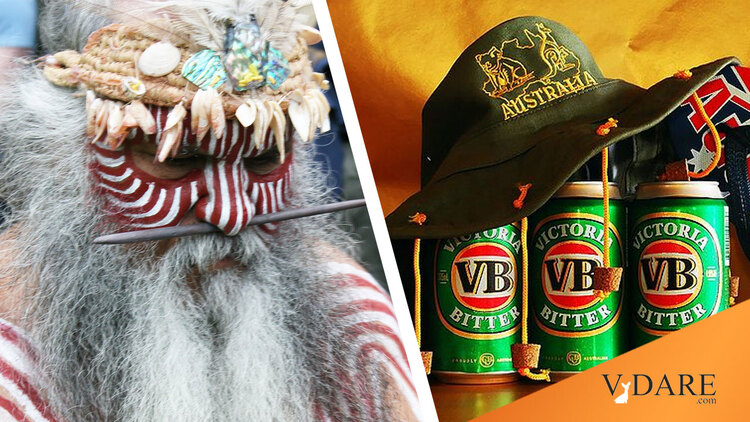
By Steve Sailer
03/13/2023
From The New York Times news section:
Authorities Reinstate Alcohol Ban for Aboriginal Australians
The reaction to a rise in crime has renewed hard questions about race and control, and about the open wounds of discrimination.
By Yan Zhuang
Yan Zhuang reported this story from Alice Springs, in Australia’s Northern Territory.
March 12, 2023
… Mr. Shaw lives in what the government has deemed a “prescribed area,” an Aboriginal town camp where from 2007 until last year it was illegal to possess alcohol, part of a set of extraordinary race-based interventions into the lives of Indigenous Australians.
Last July, the Northern Territory let the alcohol ban expire for hundreds of Aboriginal communities, calling it racist. But little had been done in the intervening years to address the communities’ severe underlying disadvantage. Once alcohol flowed again, there was an explosion of crime in Alice Springs widely attributed to Aboriginal people. Local and federal politicians reinstated the ban late last month. …
From the halls of power in the nation’s capital to ramshackle outback settlements, the turmoil in the Northern Territory has revived hard questions that are even older than Australia itself, about race and control and the open wounds of discrimination.
For those who believe that the country’s largely white leadership should not dictate the decisions of Aboriginal people, the alcohol ban’s return replicates the effects of colonialism and disempowers communities. Others argue that the benefits, like reducing domestic violence and other harms to the most vulnerable, can outweigh the discriminatory effects.
All over the world, indigenous peoples whose ancestors haven’t long been exposed to a lot of alcohol tend to have big problems with binge drinking. You can see the same pattern within Europe: Swedes and Irish have more trouble with drunkenness than do Italians or Jews, whose ancestors have been drinking wine for 5000+ years. (Italians often drink themselves into liver failure in old age, but they seldom wreck their lives over alcohol before then.)
Heck, in the Bible, a couple of ancient patriarchs, Noah and Lot, get falling down drunk in Genesis, the first book of the Old Testament, to great shame. But by the New Testament, drinking at the wedding feast of Cana is viewed in a positive light: Jesus performs a miracle to keep the wine flowing.
Presumably, Mediterranean peoples have less trouble with drunkenness on average because they’ve been drinking longer, giving natural selection longer to select ways to ameliorate the problem.
But you aren’t supposed to mention that.
Amusingly, Australians are now lectured that it’s a complete myth that Aboriginals didn’t have alcohol before Europeans arrived. You see, there’s this gum tree that grows in the Tasmanian highlands above 1000 meters from which ancient Tasmanians brewed a fermented beverage called way-a-linah.
Well, okay…
Quite a few American Indian reservations ban alcohol. I was impressed that the Barona Indian casino outside San Diego was completely dry, because the easiest way in the world to boost your casino profits is to get gamblers liquored up. The Barona Indians deserve congratulations for foregoing exploiting gamblers to make sure to keep alcohol off their reservation.
Similarly, the San Miguel Indian casino in San Bernardino had only one tiny tucked-away bar.
There are a lot of things Native Americans don’t do well, but I was extremely impressed by the liquor policy at the two Indian casinos I’ve set foot in.
How much self-rule do Aboriginals possess in the Outback?
This is a content archive of VDARE.com, which Letitia James forced off of the Internet using lawfare.